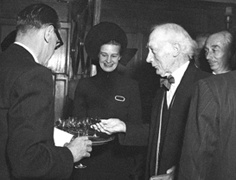Margaret Goldie(1905-1997), was a first generation teacher of the Alexander Technique(AT). She’s pictured here with F.M. Alexander, the persistent studier of himself, and of the ways we move by habit, and how these habits can cause us difficulties and pain. I started AT lessons when my back was complaining about how I was working in the studio. When I discovered Margaret Goldie’s name, I tried to find a photo, and after searching, this is the only one. Miss Goldie(as she was called), didn’t want any photos taken of her teaching, and published no books(see Miss Goldie: A Little for the Record.)
Alexander developed his technique of “good use” of the body through his relentless observations of his own movements after repeatedly losing his voice while doing public speaking. He started taking students, and these students then started various schools of AT. Miss Goldie was not one to turn her teaching into an industry. She wanted people to experience the same kind of awareness that Alexander found for himself, and that she found for herself. She left a distinct impression on her students, who often write of being both awed and scared of her. John Hunter writes of his experience with Miss Goldie:
This brings us to decision. If we have choice, then we have to make a decision. It is here that many of us get stuck. In my first or second lesson with Margaret Goldie she said, ‘Now I am going to ask you to make a decision, and it will be the first decision you’ve ever made.’ At the time I found this a very strange thing for her to say. Had I not been making decisions all my life? Had I not decided that very day to get out of bed and come and have a lesson with her? This is a very interesting question. We assume that because we end up taking one course of action rather than another that we have made a decision. But is that the case? My suspicion is that we have merely acquiesced to impulses following the path of least resistance.
This moment of freedom, before we act out of habit, is powerful. I see glimpses of it when observing myself, but there are many habits entrenched in how I move, and I get frustrated with all I need to notice, like the proverbial onion, layer after layer. I am learning it is not about “doing” Alexander, but about letting my body go into the positions of most ease. As Fiona Robb quotes Margaret Goldie(as cited in Robert Rickover’s article on Miss Goldie) : ”Any doing is an overdoing.” I like that.
More Margarets at my Margarets Pinterest Board.
My new Alexander Technique Pinterest Board.
Miss Goldie: Teacher of the Alexander Technique by Robert Rickover


By all accounts, Margaret Goldie was a wonderful teacher. I never met her, but I have compiled some material about here here: http://www.alexandertechnique.com/ats/goldie/ that might be of interest.
Thank you for leaving a comment so I could correct some things. Your very useful article is linked to Margaret Goldie’s name, but not mentioned explicitly, so I added it to the bottom of the post as well, and of course the quote about any doing being overdoing is originally cited from Fiona Robb in your same article, and I changed that as well. Your site,The Complete Guide to the Alexander Technique, is a wealth of information.
Nice to see a mention of Margaret Goldie, she seems to have been a super AT teacher. I like to read about lessons with her in a book by Fiona Robb, entitled (appropriately) ‘Not To Do’.
Might be worth finding a copy?
Best wishes,
James
Yes, my curiosity is piqued about Fiona Robb’s book and I will check it out. Thanks for the suggestion!
Through the 1980s I had many lessons with Margaret Goldie. Miss Goldie was loyal to Alexander to a fault and she once told me that no other teacher, including those trained by Alexander himself, was really qualified to train teachers. She could be extremely harsh with her pupils, especially with women. Some of this is reflected in Fiona Robb’s book, although I saw and heard much worse. And yet she was also endearingly eccentric, for example she always taught wearing a little straw hat adorned with a feather (there’s a picture of the hat on the cover of Fiona’s book)!
On one occasion, she told me that she had just received a letter from Oxford University offering her a belated degree (women were only allowed to receive degrees from Oxford under certain conditions in the 1920s – and not at all before 1920). I asked her whether she would accept the degree and she told me with dramatic indignation that, since they had waited all of these years to contact her with their “offer”, they “could just keep their degree”!
Thank you for taking the time to share your experience with Margaret Goldie!